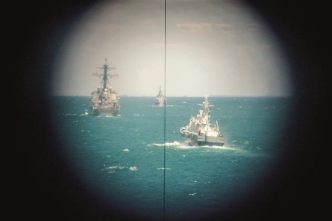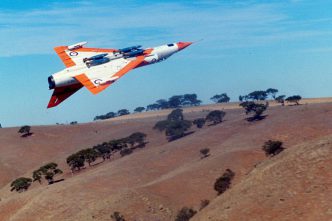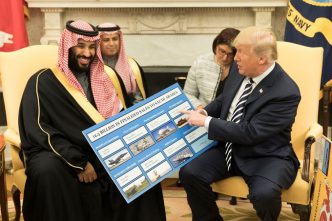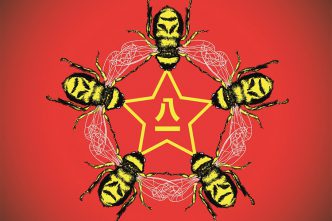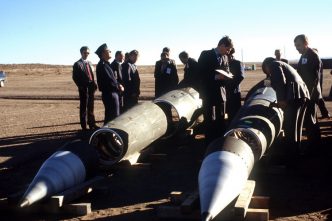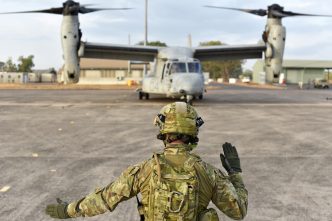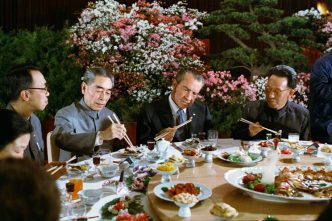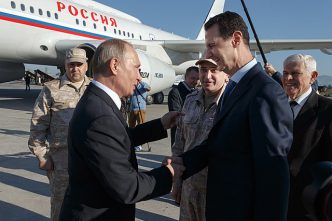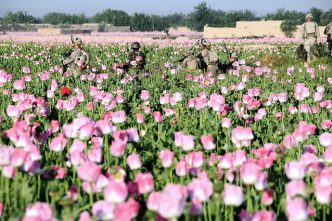Being seen as the global champion of democratic values has underpinned US global leadership as much as its economic and military preponderance. As this perception ebbs, the accompanying erosion of domestic support among European allies …
The ‘grey zone’ has received much publicity over the past decade as certain nation-states have employed indirect methods to gain advantages over their opponents without resorting to open kinetic warfare. Grey zones can be an …
Sea state The Royal Australian Navy has commissioned an experimental squadron called 822X to test the use of unmanned aircraft at sea. The Schiebel Camcopter S-100 and the Insitu ScanEagle are being trialled for use …
What should come first in international politics: values or interests? For the West, this dilemma has been thrown into sharp relief by the murder of the self-exiled Saudi journalist Jamal Khashoggi at the hands of …
So, 71 years after its creation, the Australian Signals Directorate has stepped out of the shadows. Last night ASD Director-General Mike Burgess gave probably the most broad-ranging public outline of the work of a modern, …
In 2016, Chinese student Huang Xianjun completed his PhD at the University of Manchester, working with the discoverers of graphene, a material with incredible strength, electrical conductivity and flexibility. Then he returned to China to …
Rod Lyon’s recent analysis on the Trump administration’s decision to withdraw from the 1987 Intermediate-Range Nuclear Forces Treaty with Russia concludes with a sober warning of more intense nuclear competition on the horizon. So what …
There’s been a lot of talk on The Strategist lately about a Plan B for Australia’s defence. Much of the discussion has called for increased defence spending and greater action by Australia to support the …
The Foreign Affairs team conducting Australia’s soft power review has been travelling the country to invite a national conversation about influence and persuasion. In Hobart, for example, interlocutors ranged widely from public, commercial and educational …
Competition and confrontation build between China and the US. The era of engagement fades. Superpower rivalry returns. Great power challenges great power. The world’s biggest economy faces off against the second biggest. The descriptor of …
Keeping the nation safe requires the Australian Defence Force to maximise the advantages of closely working on operations with a broad range of government agencies and allies, says the ADF’s new chief, General Angus Campbell. …
The world US President Donald Trump’s next target in a growing list of international agreements is the Intermediate-Range Nuclear Forces Treaty. Commentators in the Washington Post and The National Interest contend that Trump is right …
America’s greatest error was not the Iraq war, calamitous self-inflicted wound though it was. Rather, it was adopting Francis Fukuyama’s now discredited idea that the end of the Cold War marked ‘the universalization of Western …
‘Insanity is doing the same thing over and over again and expecting different results.’ This aphorism, often attributed to Albert Einstein, seems to be the inspiration for US President Donald Trump’s North Korea policy. Trump’s …
The release earlier this month of a major UN-sponsored scientific report on the significant impacts expected from 1.5°C of global warming—the aspirational limit countries adopted in the Paris climate agreement—generated widespread media interest. Much of …
In this special podcast, we consider the state of counterterrorism in the UK and Australia. Sir Paul Stephenson, who was commissioner of London’s Metropolitan Police from 2009 to 2011, gives his views on the situation …
Much has been written about Russia’s ambitions in Syria and the Middle East, and there are numerous elements to Moscow’s strategy in the region. President Vladimir Putin has made clear his desire to restore Russia …
The beat Losing the war on drugs Ten years after it was adopted, the United Nations Political Declaration and Plan of Action on illicit drugs has failed to reduce demand and production despite global efforts …
The German Social Democrats’ (SPD) existential crisis can no longer be treated as a typical party crisis. The party captured a mere 9.7% of the vote in regional elections in Bavaria this month and it …
For a risk manager, few metaphors resonate more than that of a ‘black swan’ event. Equally interesting is the historical link between this term denoting low likelihood but extremely significant disruptive events and Australia. Europeans …



